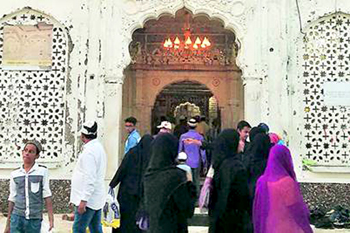Mumbai, Nov 29: Marking a victory for campaign for gender equality in places of worship, a group of women activists today entered the sanctum sanctorum of Haji Ali dargah here and offered prayers.
 The entry by members of Bharatiya Muslim Mahila Andolan (BMMA) into the mausoleum came more than a month after the Haji Ali Dargah Trust told the Supreme Court it will allow women inside the inner sanctum of the shrine. Women devotees' entry into it was banned a few years ago.
The entry by members of Bharatiya Muslim Mahila Andolan (BMMA) into the mausoleum came more than a month after the Haji Ali Dargah Trust told the Supreme Court it will allow women inside the inner sanctum of the shrine. Women devotees' entry into it was banned a few years ago.
"Around 400 women from BMMA today went to the dargah. We also offered a 'chaadar' (shawl) there and paid our respects to the saint," Zakia Soman, co-founder of BMMA, told PTI.
She said the trustees were very courteous and did not resist their entry into the sanctum sanctorum of the dargah, one of the famous landmarks of Mumbai.
"On the contrary, they offered us tea and spoke to us for some time. Their welcoming stand towards women is a great moral victory for us," she said.
The Bombay High Court had in August lifted the ban on women from entering the inner area of the dargah, saying it contravenes Articles 14, 15 and 25 (dealing with fundamental rights) of the Constitution.
BMMA, an NGO, was one of the petitioners which had challenged the ban, imposed by the Haji Ali Trust in 2012, in the High Court. The 2012 ban was based on the trust's notion that it is a "grievous sin" to let women into the inner area.
In early October, the trust moved the Supreme Court challenging the HC order. However in late October, the trust climbed down from its earlier stand and told the apex court it will grant access to women in the prohibited area.
The dargah, said to date back 600 years, is a popular religious place located on an island off South Mumbai. It houses a mosque and the tomb of Muslim saint Sayed Peer Haji Ali Shah Bukhari and is visited by people of all faiths.
Women's rights activist Trupti Desai had led a well publicised campaign seeking equal access to female devotees in places of worship, including the dargah.
After the HC order in August, she offered prayers at the shrine, but did not enter its core area.






Comments
BMMA is a financially supported organisation of RSS and the founder lady is wife of one RSS leader. She has managed to lure and fool some uneducated and poor ladies by giving money. she has nothing to do with Islam or Muslims. She did not cry while thousands of muslim women were raped and killed in Gujarat. she is not crying for the mother of Najeeb. this lady is a liar.
All the darga worshippers are innocent and dont have the proper knowledge of islam, they just follow the foothold of their elders... and majority of darga worshippers are illiterate, in islam worship place only one its masjid and its permissible in islam for women to enter in mosque and pray......in islam darga doesnt exist then where is the question of entering women to darga....if you enter darga and worship you have comited shirk and it takes you away from islam
BMMA is wing of RSS and women head of BMMA she is wife of RSS extremists.
Darga is not in Islam. This RSS women using innocent Muslim women for political gain. Dont be scapegoat and stick to deen.
17 times a day in fardh salat alone we recite sura al fatiha, and one of the sentence is:-
\You (alone) we worship, and you (alone) we ask for help.\"
Even those who visit and seek something in DARGA also in prayers recite the same verse as above.
ARE THEY LYING TO ALLAH ???????????????"
Entering Darga or entering temple it is the same. If you worship anything except Allah then destination will be HELL.
May allah guide our muslims. Darga is a place of shirk and khurafath.
There is no relation between islam and darga
There is no \DARGA\" System in ISLAM. People should seek anything from only Allah. May Allah guide right path to all Muslims."
Add new comment